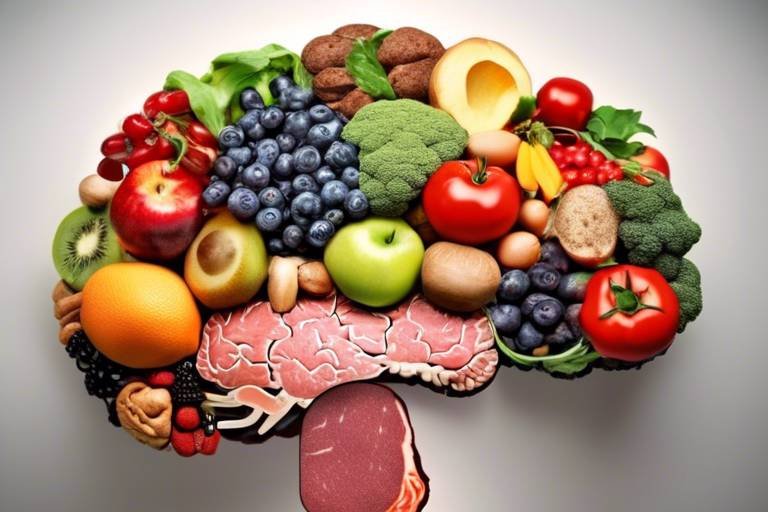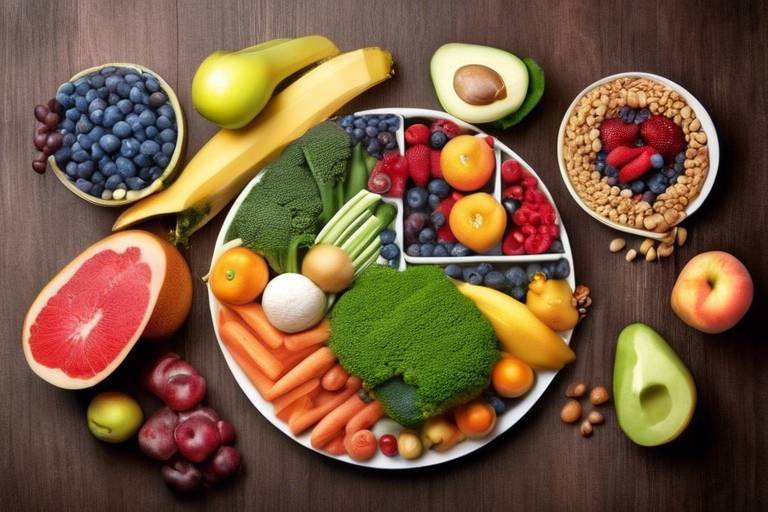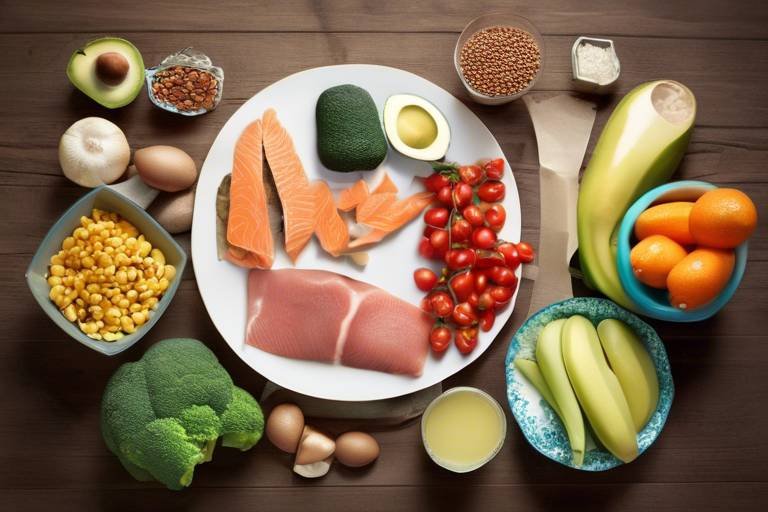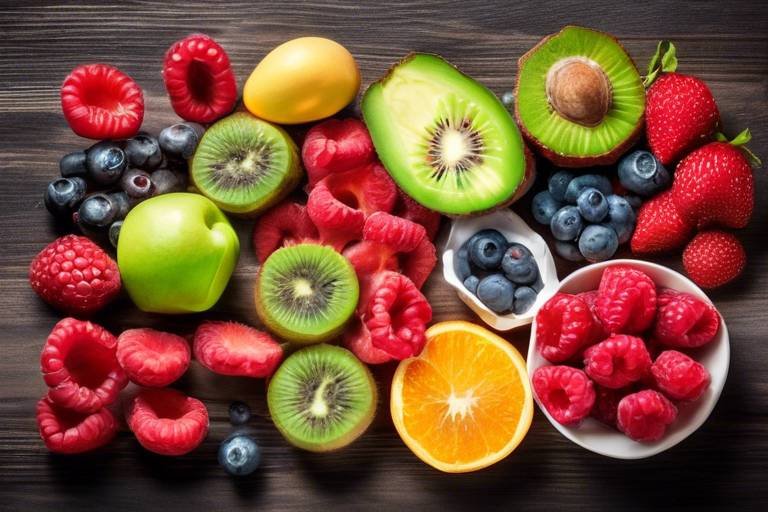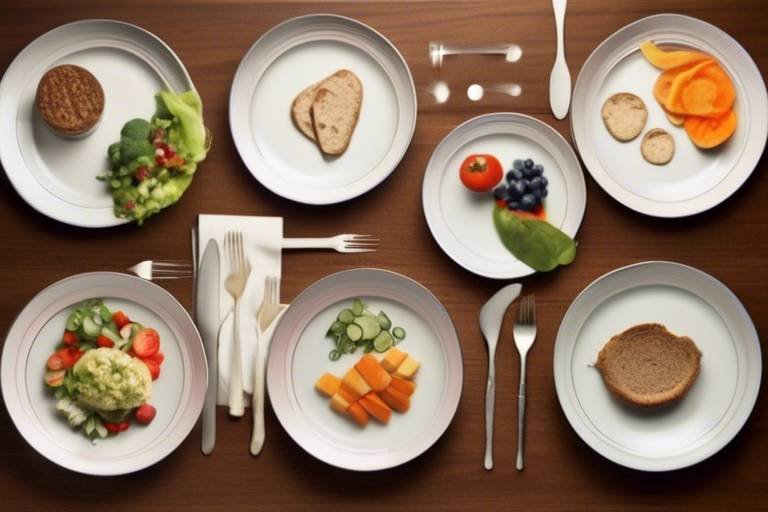Top 10 Foods for Brain Health
This article explores the best foods to enhance cognitive function and overall brain health, providing insights into their nutritional benefits and how they contribute to mental clarity and memory improvement. In our fast-paced world, maintaining a sharp mind is more crucial than ever. Just like a car needs fuel to run smoothly, our brains thrive on specific nutrients that can help boost our performance. So, let's dive into the top ten foods that are not just delicious but are also brain-boosting powerhouses!
Fatty fish are rich in omega-3 fatty acids, which are essential for brain health. Think of omega-3s as the building blocks of your brain. They support cognitive function, improve memory, and may protect against age-related decline. Including fish like salmon and mackerel in your diet is beneficial, and the best part? They’re incredibly versatile! You can grill, bake, or even toss them into a salad for a nutritious boost.
Blueberries are packed with antioxidants that may delay brain aging and enhance memory. Imagine these little berries as tiny warriors fighting off the damage caused by free radicals. Their high levels of flavonoids contribute to improved communication between brain cells, making them a delicious and nutritious choice for cognitive health. Whether you enjoy them fresh, in smoothies, or as a topping for your yogurt, blueberries are a fantastic addition to any meal.
Turmeric contains curcumin, a compound known for its anti-inflammatory and antioxidant properties. This golden spice is like a superhero for your brain! It may boost memory and stimulate the growth of new brain cells, making it a powerful ingredient for brain health. Sprinkle it on your dishes or brew it in a tea for an extra kick of flavor and health benefits.
Broccoli is a nutrient-dense vegetable high in antioxidants and vitamin K, which is believed to support cognitive function. This green powerhouse is like a multivitamin in disguise! Its rich nutritional profile makes it an excellent addition to a brain-healthy diet. You can steam it, roast it, or even blend it into a soup; the possibilities are endless!
Pumpkin seeds are a rich source of magnesium, iron, zinc, and copper, all vital for brain health. These nutrients play a role in nerve signaling and cognitive function, making them a great snack option. Think of them as little nuggets of brain food that you can munch on throughout the day. Toss them in your salads, or enjoy them raw for a crunchy snack!
Dark chocolate contains flavonoids, caffeine, and antioxidants, which can enhance memory and boost mood. Consuming it in moderation can provide cognitive benefits while satisfying your sweet tooth. Imagine indulging in a treat that not only tastes divine but also gives your brain a little pick-me-up! Just remember, moderation is key—too much of a good thing can be, well, too much!
Nuts, especially walnuts, are high in healthy fats, antioxidants, and vitamin E, which are linked to improved brain function. Regular consumption can support cognitive health and reduce the risk of neurodegenerative diseases. Picture them as tiny powerhouses packed with nutrients—perfect for snacking on the go or adding to your breakfast bowl.
Oranges are an excellent source of vitamin C, which is crucial for preventing mental decline. This vitamin helps protect against age-related cognitive decline, making oranges a tasty and beneficial fruit for brain health. Whether you enjoy them fresh, juiced, or as part of a fruit salad, they’re a refreshing way to nourish your brain!
Eggs are rich in several nutrients tied to brain health, including vitamins B6 and B12, folate, and choline. These nutrients support memory and cognitive function, making eggs a valuable part of a brain-healthy diet. Think of eggs as nature’s brain booster—whether scrambled, poached, or hard-boiled, they’re easy to incorporate into any meal.
Whole grains, such as oats, barley, and quinoa, are rich in vitamins and minerals that support brain health. They provide a steady supply of energy to the brain, ensuring you stay sharp throughout the day. Imagine fueling your brain with a steady stream of energy, preventing that dreaded mid-afternoon slump!
Q: What are the best ways to incorporate these foods into my diet?
A: You can easily add these foods to your meals. For example, try a breakfast of oatmeal topped with blueberries and walnuts, or enjoy a salad with spinach, salmon, and a sprinkle of pumpkin seeds.
Q: How often should I eat these brain-boosting foods?
A: Aim to include a variety of these foods in your diet regularly. Consistency is key to reaping the long-term benefits for your brain health.
Q: Are there any foods I should avoid for better brain health?
A: Processed foods high in sugar and unhealthy fats can negatively impact cognitive function. It’s best to limit these while focusing on whole, nutrient-dense foods.

1. Fatty Fish
This article explores the best foods to enhance cognitive function and overall brain health, providing insights into their nutritional benefits and how they contribute to mental clarity and memory improvement.
When it comes to brain health, few foods can compete with fatty fish. These oceanic delights, including varieties like salmon, mackerel, and sardines, are loaded with omega-3 fatty acids. Omega-3s are essential fats that your body cannot produce on its own, making it crucial to incorporate them into your diet. These healthy fats are not just trendy; they play a vital role in building brain and nerve cells, which are essential for maintaining optimal cognitive function.
Research has shown that consuming fatty fish regularly can lead to improved memory and overall cognitive performance. In fact, studies suggest that the omega-3s found in these fish can help protect against age-related cognitive decline. Think of omega-3s as the brain's best friend, working tirelessly to keep your mind sharp and your memory intact.
But what makes fatty fish so special? Here’s a quick breakdown of their benefits:
- Improved Memory: Omega-3 fatty acids contribute to better memory retention and recall.
- Protection Against Decline: Regular consumption may help stave off diseases like Alzheimer's.
- Mood Enhancement: Omega-3s are linked to lower rates of depression and anxiety.
Incorporating fatty fish into your meals is easier than you might think. You can grill, bake, or even enjoy it raw in sushi. Here’s a simple recipe idea: try a delicious salmon salad with leafy greens, cherry tomatoes, and a sprinkle of nuts for that extra crunch. Not only will your taste buds thank you, but your brain will also be grateful!
To give you a clearer picture of the nutritional benefits, here’s a quick comparison of some popular fatty fish:
| Type of Fish | Omega-3 Content (grams per 100g) | Other Key Nutrients |
|---|---|---|
| Salmon | 2.3 | Vitamin D, B12, Selenium |
| Mackerel | 4.0 | Vitamin D, B12, Protein |
| Sardines | 2.2 | Calcium, Vitamin D, Protein |
In conclusion, if you want to give your brain a boost, look no further than fatty fish. Not only are they delicious, but they also pack a powerful punch of nutrients that can enhance your cognitive capabilities and protect your brain as you age. So, next time you’re planning your meals, make sure to include a serving of fatty fish and watch your brain thrive!
Q: How often should I eat fatty fish for optimal brain health?
A: It is recommended to consume fatty fish at least twice a week to reap the maximum benefits for brain health.
Q: Can I get omega-3s from sources other than fish?
A: Yes, omega-3 fatty acids can also be found in flaxseeds, chia seeds, walnuts, and algae-based supplements for those who prefer plant-based options.
Q: Is it safe to eat fatty fish during pregnancy?
A: Yes, fatty fish can be beneficial during pregnancy, but it's important to choose low-mercury options and consult with a healthcare provider.

2. Blueberries
When it comes to brain health, blueberries are nothing short of a superfood. These tiny, vibrant berries are not just a delicious snack; they are packed with a wealth of nutrients that can significantly enhance cognitive function. One of the key benefits of blueberries is their high concentration of antioxidants, particularly flavonoids, which are known to combat oxidative stress in the brain. This oxidative stress can lead to cellular damage and is often linked to age-related cognitive decline.
Research suggests that the antioxidants in blueberries may help improve communication between brain cells, which is crucial for memory and overall cognitive health. Imagine your brain as a bustling city; the more efficient the traffic flow, the better everything operates. Blueberries help to keep that traffic flowing smoothly, ensuring that your brain functions at its best.
Incorporating blueberries into your diet can be as simple as tossing them into your morning oatmeal or yogurt. Here are a few delicious ways to enjoy these little powerhouses:
- Add them to smoothies for a refreshing brain boost.
- Mix them into salads for a sweet and tangy twist.
- Enjoy them frozen as a cool treat on a hot day.
Not only do blueberries taste great, but they are also low in calories, making them a guilt-free addition to your diet. Plus, they are versatile and can be used in both sweet and savory dishes. So, whether you're baking a blueberry pie or mixing them into a savory sauce, you can enjoy their benefits in various ways.
To summarize, blueberries are a powerhouse of nutrients that support brain health. Their antioxidant properties help delay brain aging and improve memory, making them a must-have in any brain-healthy diet. So, the next time you're looking for a snack, reach for a handful of blueberries and give your brain the boost it deserves!
Q: How many blueberries should I eat for optimal brain health?
A: While there's no specific recommendation, a handful of blueberries (about 1 cup) several times a week can be beneficial for brain health.
Q: Can frozen blueberries provide the same benefits as fresh ones?
A: Yes! Frozen blueberries retain most of their nutritional value, making them a great option year-round.
Q: Are there any side effects associated with eating blueberries?
A: Blueberries are generally safe to eat for most people. However, if you have allergies to berries, it's best to avoid them.

3. Turmeric
Turmeric, often referred to as the "golden spice," is not just a vibrant addition to your curry dishes; it holds incredible potential for enhancing brain health. The secret lies in its active compound, curcumin, which is celebrated for its powerful anti-inflammatory and antioxidant properties. Imagine a superhero for your brain, fighting off the villains of cognitive decline and memory loss! Research suggests that curcumin can cross the blood-brain barrier, meaning it has direct access to your brain cells, where it can work its magic.
But how does this spice actually benefit your brain? Here are some of the key ways:
- Boosts Memory: Studies have shown that curcumin may improve memory and cognitive function. It stimulates the production of brain-derived neurotrophic factor (BDNF), a protein that plays a vital role in learning and memory.
- Promotes Neurogenesis: Curcumin encourages the growth of new brain cells, which is essential for maintaining a healthy brain as we age.
- Reduces Inflammation: Chronic inflammation is linked to numerous brain disorders, including Alzheimer’s disease. Curcumin's anti-inflammatory properties can help combat this.
Incorporating turmeric into your diet can be both easy and delicious. You can add it to smoothies, soups, or even sprinkle it on roasted vegetables. If you want to take it a step further, consider making a golden milk latte by mixing turmeric with warm milk (dairy or plant-based), honey, and a pinch of black pepper to enhance absorption.
Speaking of absorption, it's worth noting that pairing turmeric with black pepper can significantly increase the bioavailability of curcumin. So, if you're planning to enjoy some turmeric, don't forget to add a dash of black pepper to maximize its benefits!
In summary, turmeric is a powerhouse spice that can contribute significantly to brain health. By incorporating it into your daily meals, you’re not just adding flavor; you’re also investing in your cognitive future. So why not spice up your life and give your brain the nourishment it deserves?
Q: How much turmeric should I consume daily for brain health?
A: While there is no official recommended daily intake, incorporating 1-2 teaspoons of turmeric into your diet can be beneficial. However, always consult with a healthcare professional before making significant changes to your diet.
Q: Can I take turmeric supplements instead of using it in cooking?
A: Yes, turmeric supplements are available, but it's best to choose high-quality products and consult with a healthcare provider to determine the appropriate dosage.
Q: Are there any side effects associated with turmeric?
A: Turmeric is generally safe for most people when consumed in culinary amounts. However, high doses may cause digestive issues or interact with certain medications, so it's important to consult with a healthcare professional if you're considering high-dose supplementation.

4. Broccoli
Broccoli is not just another green vegetable; it's a powerhouse of nutrients that can significantly enhance your cognitive function. This humble veggie is packed with antioxidants and is a fantastic source of vitamin K, which is believed to support cognitive function by promoting the formation of sphingolipids, a type of fat that is densely packed in brain cells. Imagine your brain as a bustling city; vitamin K helps keep the roads clear and the traffic flowing smoothly, allowing for better communication between brain cells.
In addition to vitamin K, broccoli is rich in other essential nutrients, such as vitamin C, fiber, and various phytonutrients. These compounds work together to combat oxidative stress and inflammation, both of which are linked to cognitive decline. Think of oxidative stress as rust on a car; it can slowly deteriorate functionality over time. By including broccoli in your diet, you're essentially giving your brain a protective shield against this deterioration.
Moreover, broccoli's high fiber content contributes to overall gut health, which is increasingly recognized for its role in brain health. A healthy gut can positively influence your mood and mental clarity. So, when you munch on broccoli, you're not just nourishing your brain; you're also fostering a healthy gut-brain connection.
Cooking methods can affect the nutrient levels in broccoli, so it's essential to choose how you prepare it wisely. Steaming is often recommended as it helps retain most of its nutrients compared to boiling. You might want to try it in various dishes, like stir-fries, salads, or even blended into smoothies for a nutritional boost. The versatility of broccoli makes it easy to incorporate into your daily meals.
To summarize, broccoli is a nutrient-dense vegetable that supports brain health in multiple ways:
- Rich in antioxidants and vitamin K
- Helps combat oxidative stress
- Supports gut health, which is linked to brain function
- Versatile in cooking and easy to incorporate into meals
Incorporating broccoli into your diet is a simple yet effective way to enhance your cognitive function and overall brain health. So next time you're planning your meals, don’t forget to add this green gem to your plate!
Q: How can I include more broccoli in my diet?
A: You can steam it, add it to stir-fries, toss it in salads, or blend it into smoothies for a nutritious boost.
Q: Is raw broccoli better than cooked?
A: Both raw and cooked broccoli have their benefits. Raw broccoli retains more vitamin C, while cooking can help make some nutrients more bioavailable. Steaming is a great option to preserve nutrients.
Q: How often should I eat broccoli for brain health?
A: Aim to include broccoli in your meals a few times a week to reap its cognitive benefits.

5. Pumpkin Seeds
Pumpkin seeds, often overlooked as mere snacks, are a powerhouse of nutrients that can significantly enhance your brain health. These tiny seeds, also known as pepitas, are packed with essential minerals that play a crucial role in cognitive function. For instance, they are rich in magnesium, which is vital for nerve signaling and can help improve memory. Additionally, pumpkin seeds contain iron, which is necessary for oxygen transport in the blood, and zinc, a mineral that supports brain signaling and is linked to improved cognitive performance.
What makes pumpkin seeds even more interesting is their high content of copper, a mineral that aids in neurotransmitter function and supports overall brain health. When you munch on these seeds, you’re not just satisfying your snack cravings; you’re also providing your brain with the nutrients it craves. Imagine your brain as a car engine—the more high-quality fuel you give it, the better it runs. Pumpkin seeds are like premium fuel for your cognitive engine!
Incorporating pumpkin seeds into your diet is simple and versatile. You can sprinkle them on salads, mix them into your morning oatmeal, or even enjoy them roasted as a crunchy snack. Here’s a quick look at the nutritional benefits of pumpkin seeds:
| Nutrient | Benefit |
|---|---|
| Magnesium | Improves memory and cognitive function |
| Iron | Essential for oxygen transport in the blood |
| Zinc | Supports brain signaling and cognitive performance |
| Copper | Aids in neurotransmitter function |
Moreover, pumpkin seeds are also a rich source of antioxidants, which help combat oxidative stress in the brain. This is particularly important as oxidative stress is linked to cognitive decline and neurodegenerative diseases. By incorporating pumpkin seeds into your daily routine, you’re not only snacking smartly but also investing in your long-term brain health.
So, the next time you’re looking for a healthy snack, reach for some pumpkin seeds. They’re not just good for your taste buds; they’re a smart choice for your brain too!
- How can I incorporate pumpkin seeds into my diet? You can add them to salads, smoothies, oatmeal, or enjoy them as a roasted snack.
- Are pumpkin seeds good for everyone? Yes, pumpkin seeds are generally safe and beneficial for most people, but those with allergies should avoid them.
- How many pumpkin seeds should I eat daily? A handful (about 1 ounce) is a great daily serving to reap the benefits without overdoing it.

6. Dark Chocolate
Ah, dark chocolate—the sweet treat that not only tantalizes your taste buds but also offers a plethora of health benefits, especially for your brain! Did you know that indulging in this delectable delight can actually enhance your cognitive function? It's true! Dark chocolate is loaded with flavonoids, which are powerful antioxidants that improve blood flow to the brain. This increased circulation can lead to better memory and overall cognitive performance. So, the next time you're craving something sweet, reach for a piece of dark chocolate instead of a sugary candy bar!
But wait, there's more! Dark chocolate also contains caffeine, which can give you that much-needed boost when you're feeling sluggish. Imagine your brain as a car engine; sometimes it needs a little fuel to rev up and perform at its best. The caffeine in dark chocolate helps to stimulate the brain, enhancing alertness and focus. Moreover, the combination of caffeine and flavonoids can lead to improved mood and increased mental clarity. Isn’t that a sweet deal?
Now, you might be wondering, "How much dark chocolate should I eat?" Well, moderation is key! Experts suggest that consuming about 1 ounce (28 grams) of dark chocolate with at least 70% cocoa content can provide the most benefits without overloading your body with sugar and calories. You can enjoy it as a snack, add it to smoothies, or even use it in baking. The versatility of dark chocolate makes it easy to incorporate into your daily diet.
Here's a quick overview of the benefits of dark chocolate:
| Benefit | Description |
|---|---|
| Improves Memory | Flavonoids enhance blood flow to the brain, boosting memory and cognitive performance. |
| Boosts Mood | Caffeine and theobromine in dark chocolate can elevate your mood and reduce stress. |
| Increases Focus | The stimulating properties of caffeine help to improve concentration and alertness. |
| Rich in Antioxidants | Dark chocolate is packed with antioxidants that combat oxidative stress in the brain. |
So, the next time you’re feeling mentally drained or need a little pick-me-up, remember that dark chocolate is not just a tasty treat; it’s a brain-boosting powerhouse. Just be sure to choose high-quality dark chocolate with a high cocoa percentage to maximize those health benefits. After all, why not enjoy a little guilt-free indulgence while giving your brain the nourishment it deserves?
- Is all chocolate good for the brain? No, not all chocolate is created equal. Dark chocolate with at least 70% cocoa content is the best choice for brain health.
- How often should I eat dark chocolate? Moderation is key! Aim for about 1 ounce a few times a week to enjoy the benefits without excessive sugar intake.
- Can dark chocolate help with stress? Yes, the compounds in dark chocolate can help lower stress hormones and improve mood.

7. Nuts
Nuts are not just a crunchy snack; they are a powerhouse of nutrition that can significantly benefit your brain health. Among the various types of nuts, walnuts stand out as the champions for cognitive function. They are rich in omega-3 fatty acids, which are essential for maintaining brain cell structure and function. Just imagine your brain as a bustling city, where omega-3s act as the vital infrastructure that keeps everything running smoothly. Without them, the city may face traffic jams—akin to cognitive decline.
Moreover, nuts are loaded with antioxidants and vitamin E, both of which play a crucial role in protecting your brain from oxidative stress and inflammation. This is particularly important as we age, as oxidative stress can lead to neurodegenerative diseases. Think of antioxidants as the firefighters in our bustling city, putting out the fires of inflammation before they can cause serious damage.
In addition to walnuts, other nuts like almonds, hazelnuts, and pecans also contribute to brain health. Here’s a quick look at some of their benefits:
| Nuts | Key Nutrients | Brain Benefits |
|---|---|---|
| Walnuts | Omega-3 fatty acids, antioxidants | Improves cognitive function and memory |
| Almonds | Vitamin E, magnesium | Supports overall brain health and reduces oxidative stress |
| Hazelnuts | Vitamin E, healthy fats | Enhances cognitive function and protects against age-related decline |
| Pecans | Antioxidants, healthy fats | Reduces inflammation and supports brain health |
Incorporating a variety of nuts into your diet can be as simple as adding them to your morning oatmeal, tossing them into a salad, or enjoying them as a standalone snack. Just a handful a day can make a significant difference in your brain's health and performance. So next time you’re reaching for a snack, consider grabbing a handful of nuts instead of chips or candy. Not only will you satisfy your cravings, but you’ll also be fueling your brain with essential nutrients.
- What are the best nuts for brain health? Walnuts, almonds, hazelnuts, and pecans are all excellent choices.
- How many nuts should I eat daily? A handful (about 1 ounce) of nuts per day is recommended for optimal health benefits.
- Can nuts help with memory? Yes, the healthy fats and antioxidants in nuts can improve memory and cognitive function.

8. Oranges
When it comes to boosting your brain health, oranges are more than just a refreshing snack; they are a powerhouse of nutrition! These vibrant fruits are loaded with vitamin C, a nutrient that plays a crucial role in maintaining cognitive function. Imagine your brain as a complex machine; vitamin C acts like the oil that keeps everything running smoothly, protecting against oxidative stress and reducing the risk of cognitive decline. Not only do they taste great, but they also offer a plethora of benefits that can help keep your mind sharp.
One of the most fascinating aspects of oranges is their ability to combat age-related cognitive decline. Research suggests that a diet rich in vitamin C can help preserve memory and mental clarity as we age. Think of it as giving your brain a protective shield against the wear and tear of time. Incorporating oranges into your daily diet can be as simple as enjoying a juicy orange in the morning, adding orange slices to your salad, or blending them into a refreshing smoothie.
But that’s not all! Oranges also contain a variety of other nutrients that contribute to overall brain health:
- Flavonoids: These compounds enhance blood flow to the brain, improving cognitive function and memory.
- Fiber: Helps maintain a healthy gut, which is increasingly linked to brain health.
- Antioxidants: Protect brain cells from damage and support overall cognitive function.
Incorporating oranges into your diet is not just delicious but also incredibly easy. You can enjoy them fresh, juiced, or even dried. Here's a quick tip: try adding orange zest to your dishes for an extra burst of flavor and nutrients! The bright, zesty flavor of oranges can elevate both sweet and savory meals, making them a versatile addition to your culinary repertoire.
In conclusion, oranges are a tasty and nutrient-rich fruit that should definitely find a place in your diet if you're looking to enhance your brain health. So, the next time you reach for a snack, consider peeling an orange and savoring not just its flavor but also its incredible benefits for your brain!
Q1: How many oranges should I eat for optimal brain health?
A1: While there isn't a specific number, including one to two oranges a day as part of a balanced diet can provide significant benefits.
Q2: Can I get the same benefits from orange juice?
A2: Freshly squeezed orange juice can provide some benefits, but it's best to consume whole oranges to maximize fiber intake and nutrients.
Q3: Are there other fruits that are good for brain health?
A3: Yes! Other fruits like blueberries, strawberries, and avocados also offer excellent brain-boosting properties.

9. Eggs
When it comes to brain health, eggs are nothing short of a powerhouse! These little nutritional gems are loaded with a variety of essential nutrients that are crucial for maintaining cognitive function and enhancing memory. One of the standout components of eggs is choline, a nutrient that plays a vital role in the production of acetylcholine, a neurotransmitter that is important for mood regulation and memory. In fact, studies suggest that adequate choline intake can significantly improve cognitive performance.
But that's not all! Eggs are also rich in several B vitamins, including vitamin B6 and vitamin B12, both of which are linked to better brain function. These vitamins help in the formation of neurotransmitters and support overall brain health. Additionally, eggs contain folate, which is essential for reducing levels of homocysteine, an amino acid that, in high levels, is associated with an increased risk of cognitive decline.
Here's a quick breakdown of some of the key nutrients found in eggs and their benefits:
| Nutrient | Benefits |
|---|---|
| Choline | Supports neurotransmitter production and memory. |
| Vitamin B6 | Helps in the formation of neurotransmitters. |
| Vitamin B12 | Essential for brain health and cognitive function. |
| Folate | Reduces homocysteine levels, lowering the risk of cognitive decline. |
Including eggs in your diet is not only easy but also versatile! You can enjoy them boiled, scrambled, poached, or even as part of a delicious omelet filled with veggies. The options are endless, making it simple to reap the benefits of this nutrient-rich food.
So, the next time you're thinking about what to have for breakfast or a snack, consider reaching for an egg. Not only will it fuel your body, but it will also give your brain the nourishment it needs to function at its best. After all, a healthy brain is a happy brain!
- How many eggs should I eat for optimal brain health? Generally, 1-2 eggs per day can be beneficial, but it's always best to consult with a healthcare provider for personalized advice.
- Can eggs help improve memory? Yes, the choline and B vitamins in eggs are linked to better memory and cognitive function.
- Are there any risks associated with eating eggs? While eggs are nutritious, moderation is key. Those with specific health conditions should consult their doctor.
- What's the best way to prepare eggs for brain health? Cooking methods like boiling or poaching are healthier options compared to frying, as they preserve nutrients without adding extra fats.
Frequently Asked Questions
- What are the best foods for brain health?
The top foods for brain health include fatty fish, blueberries, turmeric, broccoli, pumpkin seeds, dark chocolate, nuts, oranges, and eggs. These foods are rich in essential nutrients and antioxidants that support cognitive function and improve memory.
- How do omega-3 fatty acids benefit the brain?
Omega-3 fatty acids, found in fatty fish like salmon and mackerel, are crucial for brain health. They help improve memory, support cognitive function, and may even protect against age-related decline, making them a vital part of a brain-healthy diet.
- Can blueberries really enhance memory?
Absolutely! Blueberries are loaded with antioxidants and flavonoids that can enhance communication between brain cells. Regular consumption may delay brain aging and improve memory, making them a delicious and effective snack for boosting brain power.
- What role does turmeric play in brain health?
Turmeric contains curcumin, which has powerful anti-inflammatory and antioxidant properties. It may help boost memory and stimulate the growth of new brain cells, making it an excellent addition to your diet for cognitive enhancement.
- Are pumpkin seeds good for my brain?
Yes! Pumpkin seeds are rich in magnesium, iron, zinc, and copper, all of which are essential for brain health. These nutrients contribute to nerve signaling and cognitive function, making pumpkin seeds a great snack option for mental clarity.
- How does dark chocolate affect cognitive function?
Dark chocolate is packed with flavonoids and antioxidants that can enhance memory and boost mood. When consumed in moderation, it can provide cognitive benefits while also satisfying your sweet cravings. It's a tasty way to support brain health!
- What types of nuts are best for brain health?
Walnuts are particularly beneficial for brain health due to their high content of healthy fats, antioxidants, and vitamin E. Regular consumption of nuts can support cognitive function and may help reduce the risk of neurodegenerative diseases.
- Why are oranges good for my brain?
Oranges are an excellent source of vitamin C, which is crucial for preventing mental decline. This vitamin helps protect against age-related cognitive decline, making oranges a tasty and beneficial fruit for maintaining brain health.
- What nutrients in eggs support brain health?
Eggs are rich in several essential nutrients, including vitamins B6 and B12, folate, and choline. These nutrients are linked to improved memory and cognitive function, making eggs a valuable addition to a brain-healthy diet.

